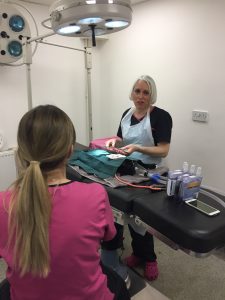Don’t give chocolate to dogs
Chocolate really is poisonous to dogs.
Chocolate contains a chemical called theobromine which affects the heart, central nervous system and kidneys and is poisonous to dogs. If your dog has decided to help itself to some of your chocolate contact your vet immediately. Our numbers are 01509 503 850 or, out of hours, our emergency care service number is 0116 255 6360
Your dog may show symptoms of restlessness, vomiting, diarrhoea, hyperactivity or seizures. But if you know your dog has eaten chocolate it is important that you act as quickly as possible and hopefully before these symptoms appear.
The amount of theobromine varies between different types of chocolate and cocoa powder and its effect depends upon the size and sensitivity of your dog – so get veterinary advice quickly.
Chocolate is also poisonous to cats but cats do not tend to like chocolate and so poisoning in cats is more rare than in dogs.
Nor Tea or Coffee
Whilst you or I would not do it dogs have been known to eat coffee grounds or tea bags and this can lead to serious problems similar to those of chocolate. A small amount of tea or coffee in a saucer is not likely to be strong enough to seriously harm your dog but we still advise that you do not feed them tea or coffee at all.
No Onions
Garlic, onions, leeks, spring onions, chives and shallots in any form can damage the red blood cells in your cat or dog and also lead to gastric problems. Foods include onion rings, steak and onions, onion soup – yes anything with onions in. Even small amounts of onion over time can poison your pet.
Or Alcohol
Alcohol is toxic to dogs and can cause vomiting, diarrhoea and even death. You can take your dog to the pub but seriously do not buy them a drink.
Avocado is dangerous for birds & rodents and may upset your dog or cat
Avocado contains a chemical called Persin and which is poisonous to Rodents and birds – don’t feed avocado to birds or rodents.
Dogs and cats can suffer from vomiting and diarrhoea after eating avocado.
Grapes & Raisins – No
Grapes and raisins can cause kidney failure in dogs.
Health nut ? It’s no to Macadamia Nuts for dogs
Macadamia nuts can cause an increase in body temperature, tremors and vomiting. So do not let your dog have Macadamia nuts.
Xylitol
Xylitol is an artificial sweetener found in many foods or separately as a direct sugar replacement. Diet and sugar free foods often contain it. If your dog eats food containing xylitol it can cause their blood sugar levels to drop. This can result in vomiting, weakness, lack of coordination or difficulty walking or standing, depression or lethargy, tremors, seizures and coma. A major sauce of Xylitol poisoning is sugar free gum.
The consequences of letting animals consume any of the above can be very serious and if you think that they have consumed some you should call a veterinary surgery for immediate advice. Our practice number is 01509 503 850 and out of hours are emergency service is on 0116 255 6360

